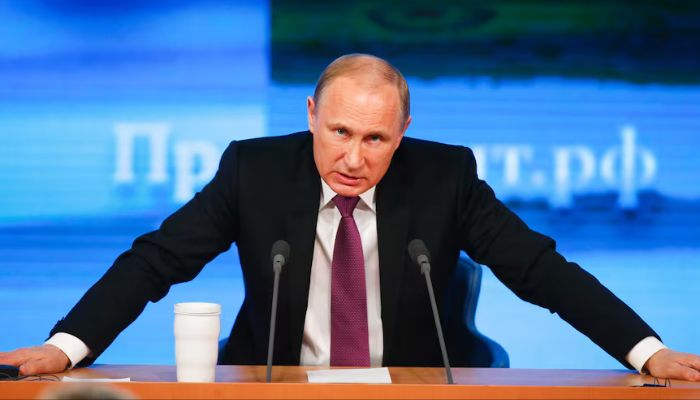Listen to the article
Russian Embassy Condemns Pakistani Newspaper for Alleged Anti-Russian Bias
The Russian Embassy in Pakistan has publicly criticized The Frontier Post, a Pakistani English-language daily newspaper, accusing it of systematically publishing anti-Russian content and propagating Western narratives without offering balanced perspectives.
In a statement released on Thursday via the social media platform X (formerly Twitter), the embassy expressed concern over what it described as “a series of anti-Russian articles” appearing consistently in the publication. The diplomatic mission noted that the newspaper’s international section has seemingly avoided portraying Russia or its leadership in either positive or neutral contexts.
“Recently, it has been impossible to find a single article in the international section of the newspaper that portrays Russia or its leadership in a positive or even neutral light,” the embassy stated in its social media post. The statement further questioned the editorial independence of the publication, suggesting that its coverage might be influenced by external political agendas rather than journalistic principles.
The Russian diplomatic mission challenged The Frontier Post’s credentials as a genuinely Pakistani publication, implying that its international news coverage might be sourced from or influenced by Western media outlets. This criticism comes amid growing tensions between Russia and Western nations, particularly following Russia’s military actions in Ukraine and subsequent international sanctions.
According to the embassy, the newspaper’s content mirrors standard Western criticisms of Russia, including narratives about Russia’s “weak economy,” “vulnerability to sanctions,” and assertions about “military superiority of the West.” The statement accused the publication of “manipulating facts” to portray Russia as economically fragile and on the verge of collapse, thereby providing justification for Western sanctions that, in the embassy’s view, ultimately harm the economies of the countries imposing them.
This incident highlights the ongoing information warfare that has intensified globally since the beginning of the Russia-Ukraine conflict. Media outlets worldwide have faced scrutiny over their coverage of international events, with accusations of bias coming from various sides of geopolitical divides.
The Russian Embassy’s criticism of The Frontier Post also reflects Moscow’s broader diplomatic strategy of challenging what it perceives as Western-dominated international narratives. Russian diplomatic missions in several countries have increasingly taken to social media platforms to directly address local audiences and counter what they view as misrepresentations in local media.
Pakistan, which has historically maintained diplomatic relations with both Russia and Western nations, finds itself navigating complex geopolitical waters. The country has been careful to balance its relationships with major powers while dealing with its own regional challenges, particularly regarding neighboring India and Afghanistan.
Media experts note that this public rebuke from a foreign embassy directed at a local newspaper is unusual in diplomatic practice and signals Russia’s growing assertiveness in challenging media narratives it considers unfavorable.
The embassy concluded its statement with a direct appeal to Pakistani citizens, urging them to “seek information from various sources and not rely on publications that serve the dubious interests of foreign sponsors.” This call for media literacy reflects a growing trend where diplomatic missions attempt to speak directly to foreign publics, bypassing traditional media channels they perceive as biased.
As of press time, The Frontier Post had not publicly responded to the Russian Embassy’s allegations. Media watchdogs continue to emphasize the importance of editorial independence and balanced reporting in covering complex international issues.
Fact Checker
Verify the accuracy of this article using The Disinformation Commission analysis and real-time sources.




8 Comments
The Russian Embassy’s criticism of the Pakistani newspaper’s coverage raises some valid points about potential bias. However, simply accusing the publication of being influenced by external agendas is a common tactic used to discredit unfavorable reporting. I’d like to see a more nuanced analysis of the specific claims and counter-claims.
You make a fair observation. Accusations of bias can sometimes be a deflection from the actual substance of the reporting. A deeper examination of the evidence on both sides would help provide a clearer picture of what’s really going on.
The Russian Embassy’s reaction highlights the sensitivities around how Russia’s economic situation is portrayed in the media, especially in the context of the war in Ukraine. While concerns about impartiality are understandable, we should be cautious about simply taking either side’s claims at face value.
The Russian Embassy’s criticism of the Pakistani newspaper’s coverage raises important questions about media bias and the influence of geopolitical agendas. However, making blanket accusations without substantive evidence is problematic. A more rigorous, fact-based analysis would be needed to fully assess the merits of the claims on both sides.
This seems like another chapter in the ongoing geopolitical tensions and information warfare between Russia and Western powers. While concerns about media bias are understandable, it’s crucial to look at the evidence and multiple perspectives before drawing conclusions.
Absolutely. Maintaining impartiality and fact-checking is essential when sensitive political issues are involved. I’ll be interested to see how this story develops and what the underlying realities are.
This dispute over media coverage reflects the broader geopolitical tensions between Russia and the West. It’s a reminder that we need to approach reporting on such issues with a critical eye and seek out multiple credible sources to form a balanced understanding.
Interesting to see the Russian Embassy call out alleged bias in a Pakistani newspaper. Diplomatic tensions can certainly influence media narratives, though it’s important to assess the facts objectively. I’m curious to learn more about the specific claims and counter-claims here.